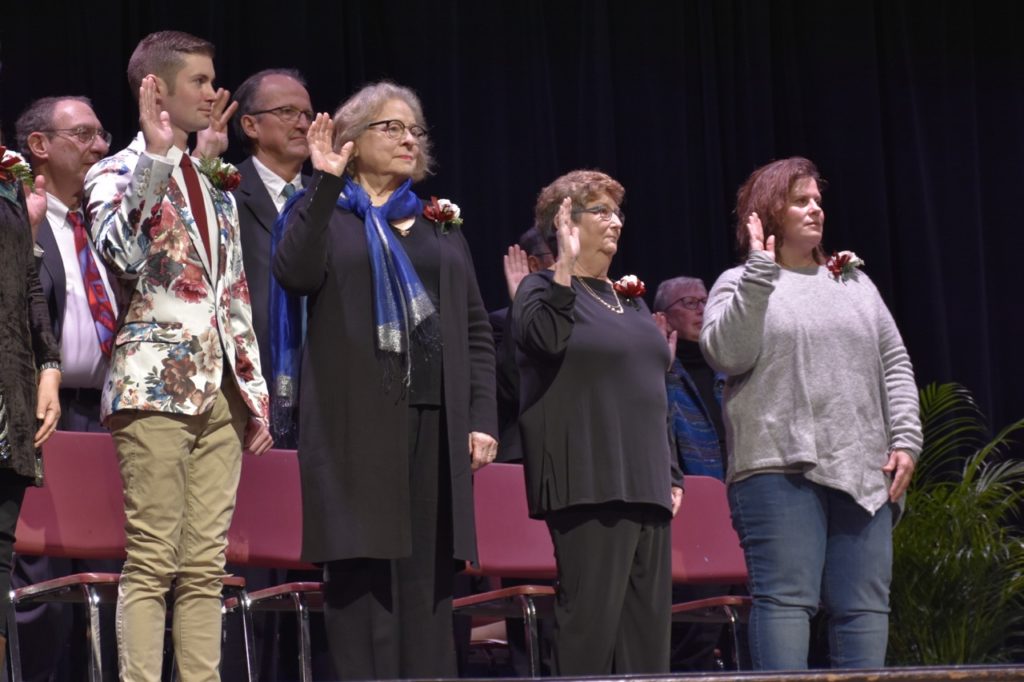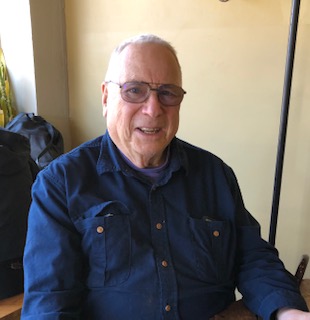OPINION: COUNCIL LEADERSHIP

Swearing in ceremony for Amherst's first city council under the new town charter at Amherst Regional High School on December 2, 2018. Front Row L-R: Evan Ross, Dorothy Pam, current Council President Lynn Griesemer and Sara Swartz. Photo: Art Keene

The Amherst Town Council will be electing its president and vice-president for its second year next Monday, and here is what we know: Nothing. The question arises, what should we know? After all, it has been a custom in Amherst for a long time for boards and committees to elect their own leadership, and it is customary for the leader to have extensive power: to set the agenda, to appoint subcommittees, to run the meetings, and to consult with their appointed executive, in this case the Town Manager. If these powers were not given to the Council president, meetings which are already much too long would become longer and, in time, subject to jockeying for power and influence that we have seen in other political bodies.
The President of the Amherst Town Council has tremendous powers, but she was not elected to her position by the voters. District 2 elected Lynn Griesemer to the Council but not to the presidency and its powers. But what she has accomplished this past year and what she will do if re-elected for a second term, should be of great interest to voters. If another councilor is planning to run for the Presidency, that would be of interest as well These things are usually settled out of the public eye and the election, at the meeting, becomes pro forma, This should be alarming.
So how can the public interest in the selection of the President and the attendant powers of the position be made known to councilors? How can councilors who have an interest in holding the position let this be made known to both voters and fellow councilors? One answer is for candidates for the position to make a public declaration of interest in time for voters to be in touch with their councilors and for councilors who wish to nominate a fellow councilor to explore their interest in being nominated. Another idea is to fill the position by lot from those councilors willing to assume it. Still another possibility is term limits to prevent any individual from becoming invested in the power of the presidency. And I’m sure there are other ideas.
These options leave the President’s powers intact, but acknowledge the potential for abuse. They may also alert all councilors that presidential powers are a matter of public interest and that the exercise of these powers should be subject to council oversight. Councillors must be alert to any abuse – or appearance of abuse – of presidential power. The councilors must acknowledge that the President has executive as well as legislative authority, and it is the exercise of the executive part of their job that should be subject to the scrutiny of the Council.
The new Charter pretty much obliterates both the separation of powers and the system of checks and balances which are the foundations of democratic government. This issue of presidential power in Amherst gains some urgency because the power is unchecked, because the presidency is designed to be removed from the voting power of residents, and because the Council is in its first year and in addition to making law it is setting precedents.
The President must be sensitive to the fact that their power does not emanate from the voters and must make every effort to be as public as possible in the exercise of their presidential authority.
One of the pleasant surprises of this first year has been the absence of unanimous votes Encouraging diversity should be one of the primary responsibilities of the Council President, but the Charter is silent about that.
At some point, the Charter itself will be up for review, and I suspect that councilors will have a lot to say about it, as will the public. To correct its many deficiencies would require another cathartic Charter Commission, and I doubt that the public is ready for that yet. But to put checks on presidential power may be done in ways which are consistent with the Charter with Council approval. This is an important matter for the Council to take up as it continues to set precedents for future town governments.

While Michael comments on the election and the executive power of the Council President, the executive power of the appointed Town Manager, and how that is guided by the Council, seems even more enigmatic. It would be interesting to hear from Michael, both descriptively and prescriptively, about the latter in a future commentary.
Rob Kusner
Thanks for sharing this, Michael.
I think it is also important to note that the powers of the Vice President are not clear. The Charter is largely silent on this point, only giving them the job of serving in the President’s absence. The Council questioned the role of the Vice President during its first election of these offices last year but I don’t believe they have discussed it since. Does the Vice President help determine the agenda? Do they consult on appointments? Are their powers dependent on the individuals elected to the posts of President and Vice President and how they choose to interact and is this a reasonable or appropriate resolution to the lack of clarity?
The power of the President of the Council to appoint members of council subcommittees should also not be underestimated. These are where the bulk of public discussion and decision-making occurs and, currently, the President and Vice President hold nearly a quarter of the available seats. If you add in the ad hoc committees, they hold more than 30% of them. Should the person(s) who determines the composition of these powerful bodies also be allowed to self-appoint to them? Is that too much power concentrated into too few people, particularly when the residents have no control over that power?
The vote that is scheduled to take place tomorrow night is extremely consequential and is largely flying under the radar of the general public. There is no announcement on the Town website’s banner and if you haven’t signed up for email notifications and don’t religiously check the agendas of every Town Council meeting, you wouldn’t have any idea this is happening. It also seems to be set to occur with no public notification beforehand about who might want to serve and why they think should wield the power of these positions.
Maria Kopicki
Rob Kusner’s elegant word “enigmatic” disguises the uncertainties and complications of the relationship between Town Manager and Town Council during this first year. Put simply, Paul Bockelman was hired under one set of rules and now the rules have changed. The new Charter offers contradiction and vagueness where direction and clarity are needed . I do not really blame either the Manager or the Council about this but it has to be faced head-on before Bockelman receives a new contract or a new Town Manager needs to be appointed. I do plan to write about this.
Maria Kopecki asks a crucial question about the general issue I discuss: Should Council Presidents, by virtue of their appointing authority, be allowed to appoint themselves to the powerful committees of the Town Council? I rather think the answer should be “no.” The power to appoint is power enough. An alternative might be to give the President “ex officio” positions on all committees, positions without a vote. But the issue is important, and the concentration of power in the hands of the President is both unseemly and potentially dangerous
Thank you for the opportunity to comment.
How long is a term? Not enough to have every 1 serve as President? The top 3 vote recipients each have an equal length term? Or share those 2 or three with the At Large members? Certainly something simple (yet fair) can be designed…
Chad Fuller
Chad, thanks for your comment. According to the new Charter, the President and Vice-President serve one year terms, and are elected by the members of the Town Council. Nothing prevents them from being re-elected. Your ideas are interesting; a rotating presidency might address some of the concerns I raise.